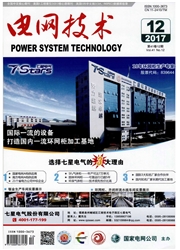

 中文摘要:
中文摘要:
提出了一种居民用户空调系统运行控制算法。该算法根据室外温度的预测值和电力公司发布的电价信号对空调系统的运行进行控制。为此,在用电费用指标的基础上,引入了定量反映用户舒适度的指标,建立了同时优化用电费用指标和用户舒适度指标的多目标优化模型。建模过程中采用蒙特卡洛仿真法和情景消减技术来处理室外温度预测误差带来的不确定性。采用改进的粒子群算法对模型进行求解。对提出的算法进行了仿真实验,并与传统的恒温控制模式和以最小化用电费用为目的的单目标优化控制算法进行了对比。实验结果表明,多目标优化算法能更好地兼顾用户的经济需求和舒适度需求,从而验证了该算法的有效性。
 英文摘要:
英文摘要:
To implement demand response in residential sector in smart grid, a control algorithm, which controls air conditioning systems in smart grids according to predicted outdoor temperature and electricity price published by power company, is proposed. For this reason, on the basis of power consumption expense index, an index reflecting the comfort degree of air conditioning users quantitatively is led in, and a multi-objective optimization model, which optimizes power consumption expense index and comfort degree index of air conditioning users, is established. During the model, the Monte Carlo simulation and scenarios reduction technique are utilized to cope with the uncertainty due to the error of predicted outdoor temperature. The improved particle swarm optimization algorithm is used to solve the proposed model. Simulation experiments of the proposed algorithm are performed, and simulation results are compared with those by both traditional constant temperature control mode and single-objective control algorithm, which takes the minimized power consumption expense as the objective. Experimental results show that the proposed multi-objective optimization algorithm can well cope with both economical demand and demand on comfort degree of users simultaneously, thus the effectiveness of the proposed algorithm is validated.
 同期刊论文项目
同期刊论文项目
 同项目期刊论文
同项目期刊论文
 期刊信息
期刊信息
